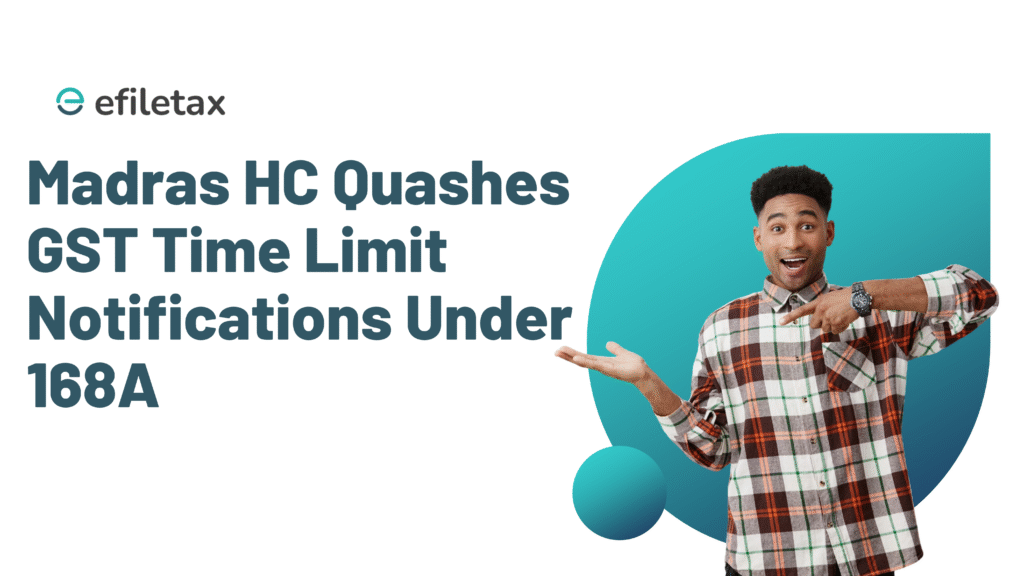
GST Limitation Extension Under Section 168A Declared Invalid by Madras High Court
The Madras High Court has struck down GST Notifications 9/2023 and 56/2023 issued under Section 168A of the CGST Act. These notifications, which extended the limitation period for tax proceedings under Section 73, were declared ultra vires due to lack of legal basis and misuse of delegated powers.
Let’s break this down in simple terms — especially for Indian taxpayers and consultants dealing with GST show cause notices for FY 2017–18 to 2019–20.
What Is Section 168A of the CGST Act?
Section 168A allows the Central or State Government to extend timelines for various actions (like issuing notices, completing adjudication) only if:
- There is a force majeure event (like COVID-19), and
- It is based on the recommendation of the GST Council
This provision was added during the pandemic to address genuine delays caused by external events.
What Went Wrong With GST Notifications 9/2023 and 56/2023?
The Central Government used Section 168A to extend limitation for issuing show cause notices under Section 73 for older years (2017–18 to 2019–20). But the High Court found three major flaws:
1. No Force Majeure Link
- The reason cited was COVID-19.
- But the delay was due to lack of staff and system issues, not the pandemic.
- As per law, there must be a direct causal link to the force majeure.
✅ Legal Point: Explanation to Section 168A must be interpreted narrowly using the ejusdem generis rule — meaning only similar events like a natural disaster or pandemic qualify.
2. No Prior GST Council Recommendation
- Section 168A requires prior recommendation from the GST Council, not from any sub-committee.
- But Notification No. 56/2023 was issued based on the GST Implementation Committee (GIC) — which has no legal power to recommend.
- The Council only gave post-facto approval, which is not valid under law.
✅ Legal Rule: A jurisdictional precondition like GST Council’s recommendation must come before issuing the notification.
3. SC’s Order Under Article 142 Still Governs Limitation
- The Supreme Court, via suo motu orders, excluded the period from 15.03.2020 to 28.02.2022 from limitation for all proceedings.
- The GST Notifications did not extend the limitation — instead, they tried to replace the already extended timeline.
✅ Court View: Exclusion (SC order) and Extension (168A) are different. One removes time from computation, the other adds time. Both must be read together — but the SC’s constitutional order prevails.
Expert Insight:
“When delegated legislation overrides Supreme Court directions or bypasses statutory conditions, it loses legitimacy. Section 168A is not a tool to fix administrative inefficiency. The GST Council’s role is not optional — it is foundational.”
— A Senior Tax Advocate, Madras HC
What This Judgment Means for Taxpayers
- Show Cause Notices (SCNs) issued under the extended limitation may now be invalid.
- Taxpayers can challenge such notices citing this judgment.
- Assessing officers must treat past notices as fresh SCNs and give 8 weeks for objections.
- Adjudication must now follow due process, post this judgment.
Summary Table
| Issue | Madras HC View |
|---|---|
| Force majeure (COVID-19) invoked | Invalid – Not the real cause of delay |
| GST Council recommendation | Mandatory – GIC cannot substitute it |
| Article 142 SC limitation order | Prevails – Cannot be overridden by 168A |
| Delegated legislation validity | Violated statutory conditions – ultra vires |
Legal References
- Section 168A, CGST Act, 2017
- Madras High Court Judgment – W.P. Nos. 17184 etc. dated 12.06.2025
- SC Suo Motu Writ (Misc.) No. 3 of 2020 – Order dated 10.01.2022
- Article 142, Constitution of India
For the official court judgment, you can refer to Madras High Court website
Practical Tip for Tax Consultants
If your client has received a GST SCN relying on these now-struck-down notifications, file objections citing this case. Seek remand or quashing depending on the stage. Don’t assume the extension was valid.
FAQs
Q1. Does this ruling apply across India?
No, it’s binding only in Tamil Nadu jurisdiction, but persuasive elsewhere unless overruled or stayed by a higher court.
Q2. What if a fresh notice is issued now?
It will be valid only if issued within the original limitation period as modified by the Supreme Court’s exclusion order, not the notifications.
Q3. Can CBIC issue a fresh notification under 168A?
Only if there is a valid force majeure and prior GST Council recommendation — not administrative delay.
Final Word
The Madras HC ruling is a critical precedent in limiting arbitrary executive action in tax matters. It upholds the constitutional principle that taxation powers must be exercised with accountability, especially when affecting taxpayers’ rights.
If you’re unsure whether your GST notice is affected by this judgment — let Efiletax help.
👉 Consult GST Experts Now on Efiletax.in
Summary:
Madras HC strikes down GST Notifications 9/2023 and 56/2023 under Section 168A. No force majeure, no GST Council nod. SC’s exclusion order applies.